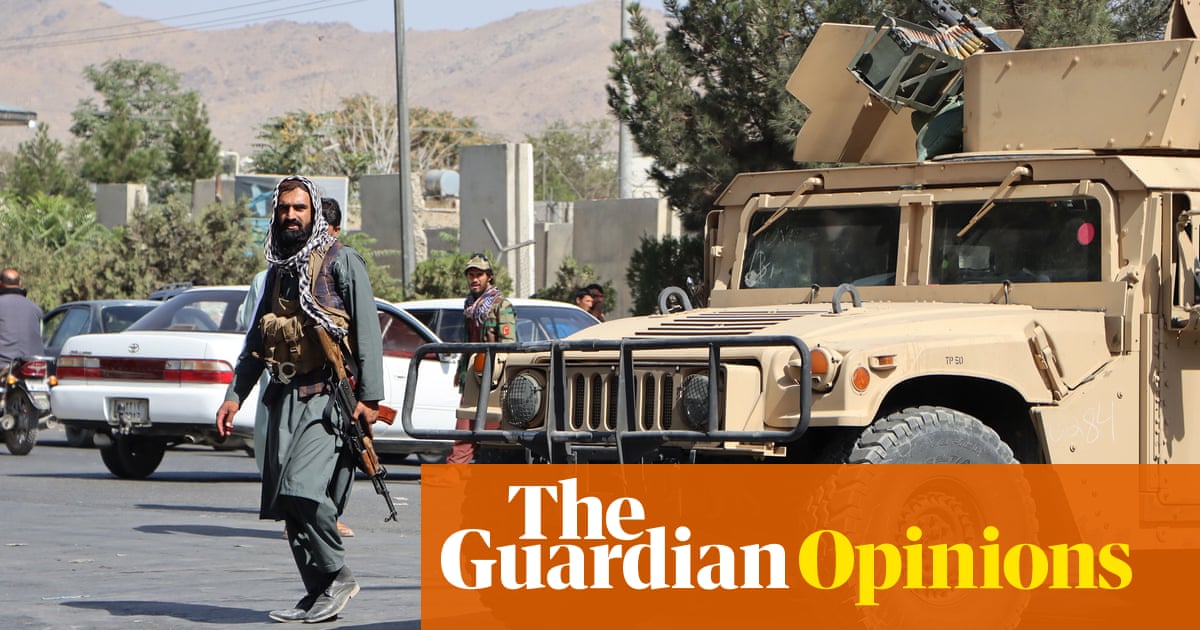
Show caption ‘The Taliban have clearly indicated their desire for international recognition, or at least acceptance.’ Fighters on guard outside Kabul airport. Photograph: EPA Opinion The west has to ask itself: if IS is the enemy, does that make the Taliban our friends? Jason Burke Afghanistan’s new rulers are far better equipped than the US and its allies to take the fight to the Kabul airport bombers Fri 27 Aug 2021 15.12 BST Share on Facebook
Share on Twitter
Share via Email
After the bloodshed at Kabul airport, the grim reality for those who want to prevent Islamic State’s affiliate causing further murder and mayhem in Afghanistan is that in practice their best partner for this complex and difficult battle would be the Taliban.
Islamic State Khorasan Province (ISKP) – the name is borrowed from that used by early Islamic empires to describe much of modern Iran, Afghanistan and Pakistan – was founded six years ago. Until this week it had been something of a failure. Though the group made early gains, these were rapidly lost as the Taliban fought back hard: they were not going to allow an upstart newcomer, particularly one largely composed of disaffected former Taliban commanders, Pakistanis and Uzbeks, to take over.
In 2019 and early 2020, a series of Taliban offensives, as well as US and Afghan government operations, devastated ISKP in eastern Afghanistan, reducing its hold on territory to just two small valleys in Kunar, the north-east frontier province. Yet despite several offensives this year, the Taliban have not been able to evict ISKP’s fighters from these bases. Now that the Taliban no longer have to fight elsewhere, many more forces can be concentrated against them and they may well be eliminated at some stage soon.
But, though this would be a significant blow to ISKP, it underlines the dilemma facing the US. The rule in Afghanistan has long been “my enemy’s enemy is my friend”. This determines which local powerbrokers the Americans will choose to support – for example, which actor is most likely to provide them with the resources they need to maintain their influence – and who they should fight. But if the enemy of the US is ISKP, does that make the Taliban its friend?
That ISKP is the enemy of both the US and the Taliban is crystal clear. It derives its ideology from the hardline “Salafi-jidahist” doctrines, influenced by Gulf-style Wahabi strands of Muslim observance and the globalised vision of men such as Osama bin Laden. Its ultimate aim is a caliphate stretching across the Islamic world – a single “nation of Islam” within which individual nations are dissolved. One of the insults hurled by ISKP members at the Taliban, who they already consider “apostates” for their (relative) moderation and negotiations with the west, is that they are also nationalists.
The Taliban have never hidden their belief in the nation state, though it is undoubtedly often tinted with a degree of ethnic and sectarian chauvinism. Nor have the Taliban ever been linked directly to any terrorist attack beyond Afghanistan’s frontiers. They do not seek to establish a caliphate either. The state they have been fighting for is an “emirate”, a much less ambitious proposal than the unified Islamic superpower sought by IS.
As ISKP has regained strength over the past year, bolstered by a $20m (£15m) donation from the IS leadership in Iraq, its attacks have included an assassination campaign against mid-level Taliban officials. The bombing of Kabul airport was aimed as much at undermining the claim of the new rulers of Afghanistan to a monopoly of violence, as at the US. Unsurprisingly, the people who know most about ISKP on the ground – who have the names of its commanders, can run down its finance networks or even simply detain the arms dealers from which it has been buying significant amounts of weaponry in recent weeks – are the Taliban.
The US, by contrast, has just dismantled its intelligence networks and hardware, pulled out its staff, and paid off or evacuated its sources. Now the US is relying on what President Biden calls “over the horizon” counter-terrorist capacity. Yet no neighbouring country is likely to be enthusiastic about helping; and, though undoubtedly impressive, the US intelligence’s long-range tools have their limits. These cannot alone produce information of the same quality as that garnered by people on the ground.
Meanwhile, the Taliban have clearly indicated their desire for international recognition, or at least acceptance. Quite how much their leaders are prepared to compromise core beliefs to achieve this is as yet unclear but, in practical terms, cooperation with the US in the battle against a mutual enemy is certainly possible. This might be no more than the secret sharing of intelligence. A Taliban tipoff for a US drone strike on a top ISKP commander would seem a mutually beneficial arrangement, for example. Security officials 7,000 miles away from Kabul would probably leave others to ponder the moral and ethical questions raised by such deals with an abhorrent regime.
But once again the US has found it cannot simply leave a country without consequences, and that the rules of the game are determined by those who live there, not by policymakers in Washington. So Washington needs to choose: which enemy, and which friend.
Jason Burke is the Guardian’s Africa correspondent. He covered the 2001 war in Afghanistan and his most recent book is The New Threat from Islamic Militancy
The fall of Afghanistan: join a Guardian Live online event with our journalists Emma Graham-Harrison, Peter Beaumont and Julian Borger analysing the latest developments. Monday 6 September at 7pm BST. Book your tickets here. All profits will be donated to relevant charities








